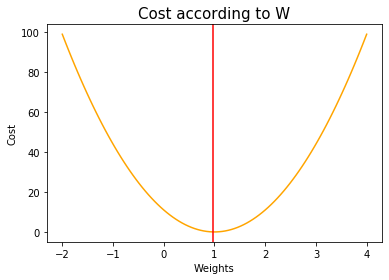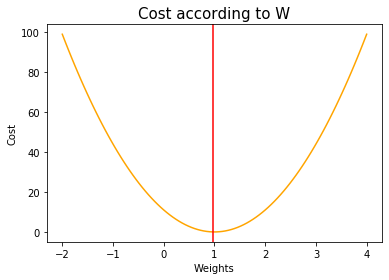How to minimize cost in Linear Regression Model
List of Tensorflow 2.0 Tutorials
- TF2.0 - 01.Simple Linear Regression
- TF2.0 - 02.Linear Regression and How to minimize cost
- TF2.0 - 03.Multiple Linear Regression
- TF2.0 - 04.Logistic Regression
- TF2.0 - 05.Multinomial Classification
- TF2.0 - 06.Iris Data Classification
We will define a cost function in a simple linear regression model and minimize the cost value.
Hypothesis
\[H(x) = Wx\]For simplicity, we will assume hypothesis with zero intercept.
Cost
\[cost(W) = {1 \over m} {\sum_{i=1}^m} (Wx_i-y_i)^2\]The cost function is defined as the mean of the squared difference between the hypothesis and the y-values.
Libraries
import numpy as np
import tensorflow as tf
import matplotlib.pyplot as plt
print("TensorFlow Version: %s" % (tf.__version__))
TensorFlow Version: 2.0.0
Data
X = np.array([1,2,3,4,5])
Y = np.array([1,2,3,4,5])
Defining cost function with numpy
def cost_func(W, X, Y):
err = 0
for i in range(len(X)):
err += (W*X[i]-Y[i])**2
cost = err / len(X)
return cost
Let’s make 100 intervals between -2 and 4, and look at the cost changes with these weights.
cost_list = []
W_range = np.linspace(-2, 4, num=100)
for feed_W in W_range:
curr_cost = cost_func(feed_W, X, Y)
cost_list.append(curr_cost)
if len(cost_list) % 20 == 0:
print("W: %s \nCost: %s \n" % (feed_W, curr_cost))
W: -0.8484848484848484
Cost: 37.58585858585859
W: 0.36363636363636376
Cost: 4.454545454545453
W: 1.5757575757575757
Cost: 3.646464646464646
W: 2.787878787878788
Cost: 35.161616161616166
W: 4.0
Cost: 99.0
Among the weights set above, when the weight is about 1, the cost is the smallest as 0.
minimum_index = cost_list.index(min(cost_list))
optimal_W = W_range[minimum_index]
optimal_cost = cost_list[minimum_index]
print("Optimal W: %s" % optimal_W)
print("Optimal Cost: %s" % optimal_cost)
Optimal W: 0.9696969696969697
Optimal Cost: 0.010101010101010083
plt.title('Cost according to W', size=15)
plt.plot(W_range, cost_list, color='orange')
plt.axvline(x=optimal_W, color='red')
plt.xlabel('Weights')
plt.ylabel('Cost')
plt.show()

How to define Cost Function in TensorFlow 2.0
Now let’s minimize the cost with TensorFlow.
X = np.array([1,2,3,4,5])
Y = np.array([1,2,3,4,5])
def cost_func(W, X, Y):
hypothesis = W*X
cost = tf.reduce_mean(tf.square(hypothesis-Y))
return cost
cost_list = []
W_range = np.linspace(-2, 4, num=100)
for feed_W in W_range:
curr_cost = cost_func(feed_W, X, Y)
cost_list.append(curr_cost)
if len(cost_list) % 20 == 0:
print("W: %s \nCost: %s \n" % (feed_W, curr_cost))
W: -0.8484848484848484
Cost: tf.Tensor(37.58585858585859, shape=(), dtype=float64)
W: 0.36363636363636376
Cost: tf.Tensor(4.454545454545453, shape=(), dtype=float64)
W: 1.5757575757575757
Cost: tf.Tensor(3.646464646464646, shape=(), dtype=float64)
W: 2.787878787878788
Cost: tf.Tensor(35.161616161616166, shape=(), dtype=float64)
W: 4.0
Cost: tf.Tensor(99.0, shape=(), dtype=float64)
minimum_index = cost_list.index(min(cost_list))
optimal_W = W_range[minimum_index]
optimal_cost = cost_list[minimum_index]
print("Optimal W: %s" % optimal_W)
print("Optimal Cost: %s" % optimal_cost.numpy())
Optimal W: 0.9696969696969697
Optimal Cost: 0.010101010101010083
plt.title('Cost according to W', size=15)
plt.plot(W_range, cost_list, color='orange')
plt.axvline(x=optimal_W, color='red')
plt.xlabel('Weights')
plt.ylabel('Cost')
plt.show()

Gradient Descent
\[cost(W) = {1 \over m} {\sum_{i=1}^m} (Wx_i-y_i)^2\] \[W:=W-\alpha{1\over m} {\sum_{i=1}^m} (Wx_i-y_i) x_i\]alpha = 0.01
gradient = tf.reduce_mean(tf.multiply(tf.multiply(W, X) - Y, X))
descent = W - tf.multiply(alpha, gradient)
W.assign(descent)
Use the derivative of the Cost function for W to update Weights.
tf.random.set_seed(2020)
x_data = [1,2,3,4,5]
y_data = [1,3,5,7,9]
W = tf.Variable(tf.random.normal([1], mean=0.0))
for step in range(300):
hypothesis = W * X
cost = tf.reduce_mean(tf.square(hypothesis-Y))
alpha = 0.01
gradient = tf.reduce_mean(tf.multiply(tf.multiply(W, X) - Y, X))
descent = W - tf.multiply(alpha, gradient)
W.assign(descent)
if step % 50 == 0:
print("#%s \t W: %s \t Cost: %s" % (step, W.numpy(), cost.numpy()))
#0 W: [0.02011158] Cost: 13.3341675
#50 W: [0.99711144] Cost: 0.00011587101
#100 W: [0.99999154] Cost: 1.0004442e-09
#150 W: [0.99999976] Cost: 5.2295944e-13
#200 W: [0.99999976] Cost: 5.2295944e-13
#250 W: [0.99999976] Cost: 5.2295944e-13
List of Tensorflow 2.0 Tutorials
- TF2.0 - 01.Simple Linear Regression
- TF2.0 - 02.Linear Regression and How to minimize cost
- TF2.0 - 03.Multiple Linear Regression
- TF2.0 - 04.Logistic Regression
- TF2.0 - 05.Multinomial Classification
- TF2.0 - 06.Iris Data Classification
댓글남기기